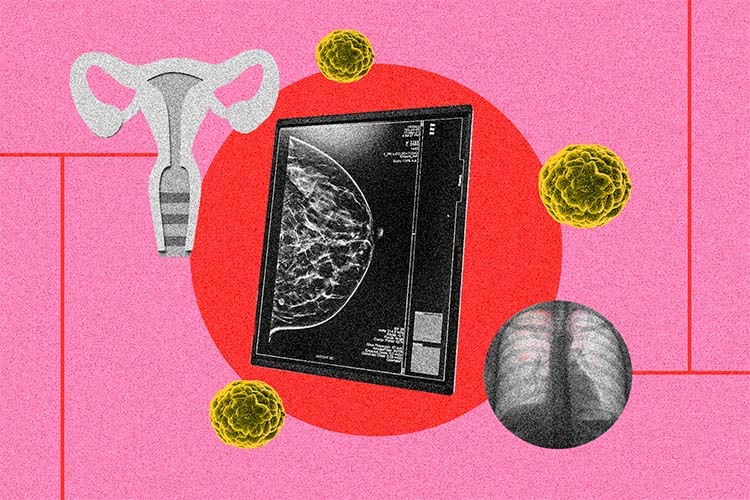By Fernanda Mesa Chávez, Misael Salazar Alejo and Cynthia Villarreal Garza
Breast cancer typically develops from a mix of genetic, hormonal, and environmental factors. Because other cancers share these same risk factors, people who have had breast cancer are at higher risk of developing a second type of cancer after their initial diagnosis. [1-4]
For this reason, survivors must undergo regular screenings. These tests can detect cancers early, when treatment is more likely to be successful.
Screening strategies currently exist for cervical, colorectal, and lung cancers, which are among the most common types both in the general population and in breast cancer survivors.
According to the American Cancer Society (ACS) and the American Society of Clinical Oncology (ASCO), survivors should follow the same screening recommendations as the general population [5-8]:
- Cervical cancer: Women aged 25 to 65 should have an HPV test every 5 years or a Pap smear every 3 years.
- Colorectal cancer: Adults 50 to 75 can choose one of the following: an annual fecal occult blood test, a flexible sigmoidoscopy (exam of the rectum and part of the colon) every 5 years, a CT colonography every 5 years, or a colonoscopy every 10 years.
- Lung cancer: Adults 50 and older who have smoked at least one pack per day for 20 years or more should get a low-dose CT scan every year.
Screening in Breast Cancer Survivors
A study in Mexico, Screening Adherence for Second Primary Malignancies in Breast Cancer Survivors: Behaviors, Facilitators, and Barriers to Enhance Quality Care, examined how well breast cancer survivors follow recommended screenings for cervical, colorectal, and lung cancers.
The goal was to identify barriers and facilitators to completing these tests. Published in Seminars in Oncology, the study surveyed breast cancer survivors online. [9]
Results showed that 74% of participants were up to date with cervical cancer screenings, exceeding the 70% target set by the World Health Organization (WHO). [10] In contrast, only 29% had completed recommended colorectal cancer screenings—far below the 80% goal set by the National Colorectal Cancer Roundtable. [11]
For lung cancer, none of the survivors met the criteria for low-dose CT screening.
The main reason for skipping screenings was a lack of medical recommendation. Other factors included fear, anxiety, and lack of interest.
Most participants (96%) were aware that breast cancer survivors can develop other types of cancer. However, gaps in knowledge remain: 69% believed routine tests like X-rays and blood work could detect any cancer, and 9% thought additional screenings weren’t necessary if they were receiving regular breast cancer checkups.
Despite these misconceptions, attitudes toward screening were largely positive: nearly all participants (96%) said they would undergo the tests if recommended by their doctor, recognizing the benefits for themselves and their families.
These findings underscore the critical role of oncology specialists in promoting adherence to cancer screenings—by educating patients, addressing fears, and ensuring that survivors complete recommended tests.
References
- Mellemkjær L, Friis S, Olsen JH, et al. Risk of second cancer among women with breast cancer. Int J Cancer 2006;118(9):2285–92.
- Matesich MA, Shapiro CL. Second cancers after breast cancer treatment. Semin Oncol 2003;30(6):740–8.
- Molina-Montes E, Pollán M, Payer T, et al. Risk of second primary cancer among women with breast cancer: a population-based study in Granada (Spain). Gynecol Oncol 2013;130(2):340–5.
- Dong C, Hemminki K. Second primary neoplasms in 633,964 cancer patients in Sweden, 1958-1996. Int J Cancer 2001;93:155–61.
- Runowicz CD, Leach CR, Henry NL, et al. American cancer society/American society of clinical oncology breast cancer survivorship care guideline. J Clin Oncol 2016;66(1):43–73.
- Fontham ETH, Wolf AMD, Church TR, et al. Cervical cancer screening for individuals at average risk: 2020 guideline update from the American Cancer Society. CA Cancer J Clin 2020;70:321–46.
- Wolf AMD, Fontham ETH, Church TR, et al. Colorectal cancer screening for average-risk adults: 2018 guideline update from the American Cancer Society. CA Cancer J Clin 2018;68:250–81.
- Wolf AMD, Oeffinger KC, Shih TYC, et al. Screening for lung cancer: 2023 guideline update from the American Cancer Society. CA Cancer J Clin 2024;74:50–81.
- Mesa-Chavez F, Salazar-Alejo M, Villarreal-Garza C. Screening Adherence for Second Primary Malignancies in Breast Cancer Survivors: Behaviors, Facilitators, and Barriers to Enhance Quality Care. Semin Oncol 2024;51(5-6):156–160.
- Organization World Health. Global strategy to accelerate the elimination of cervical cancer as a public health problem. World Health Organization 2020;21(8):1447–51.
- Wender R, Brooks D, Sharpe K, Doroshenk M. The National colorectal cancer roundtable: past performance, current and future goals. Gastrointestinal Endoscopy Clin N Am 2020;30:499–509 Preprint at.
.
Authors
Fernanda Mesa Chávez – Coordinator of the Oncology Research Group at the TecSalud Breast Cancer Center. As an author for TecScience, she has published her findings aimed at improving care and well-being for patients diagnosed with breast cancer.
Misael Salazar Alejo – Clinical Researcher at the TecSalud Breast Cancer Center.
Cynthia Villarreal Garza – Director of the TecSalud Institute of Oncology and professor at Tecnológico de Monterrey. She founded and leads Joven & Fuerte: Program for the Care and Research of Young Women with Breast Cancer and is a founding partner of the nonprofit organization Doctors and Researchers in the Fight Against Breast Cancer. She is also a science communicator and contributor to this portal.















